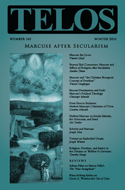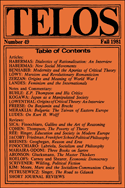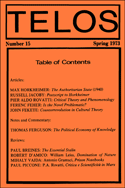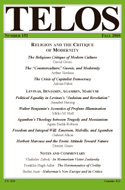By Joseph Diaz · Tuesday, January 21, 2014 Joseph Diaz’s “Schmitt and Marcuse: Friends, Force, and Quality” appears in Telos 165 (Winter 2013). Read the full version online at the Telos Online website, or purchase a print copy of the issue in our store.
 This article aims at exploring the potential for a politically operative theory of opposition to liberalism’s stultifying politics of process. Given their formal political positionality as critics of liberal neutrality, as well as their historically particular relationship to some of the most volatile politics of the twentieth century, Marcuse and Schmitt cannot but be brought into discourse with one another in the most pressing of times, for three reasons. First, by exploring the modalities of their respective criticisms, this article locates an enemy common to both thinkers in the neutralization of the political through the attempted elimination of the decision. Second, in using Schmitt’s framework of the friend-enemy distinction, further investigation into the potential complicities between anti-liberal thought illuminates the limitations of founding political friendship on mere enemy identification alone. This article aims at exploring the potential for a politically operative theory of opposition to liberalism’s stultifying politics of process. Given their formal political positionality as critics of liberal neutrality, as well as their historically particular relationship to some of the most volatile politics of the twentieth century, Marcuse and Schmitt cannot but be brought into discourse with one another in the most pressing of times, for three reasons. First, by exploring the modalities of their respective criticisms, this article locates an enemy common to both thinkers in the neutralization of the political through the attempted elimination of the decision. Second, in using Schmitt’s framework of the friend-enemy distinction, further investigation into the potential complicities between anti-liberal thought illuminates the limitations of founding political friendship on mere enemy identification alone.
Continue reading →
By Vincent Geoghegan · Monday, January 13, 2014 Vincent Geoghegan’s “Marcuse and ‘the Christian Bourgeois Concept of Freedom'” appears in Telos 165 (Winter 2013). Read the full version online at the Telos Online website, or purchase a print copy of the issue in our store.
 Current talk of the post-secular necessarily invites analysis of the nature of the secular, particularly its historical genesis and subsequent development. The task is to reject what Charles Taylor in A Secular Age has termed “subtraction stories” of the emergence of secularism, involving simplistic assumptions about the inexorable evaporation and attenuation of the religious, and instead understand the complex constitutive role religion has played in the construction of the secular. Marcuse’s work is of interest in this respect because beginning with his 1930s analysis of what he terms “the Christian bourgeois concept of freedom” within the Protestant Reformation, he explores the ways in which he believes modern secular society emerged out of Christianity. Current talk of the post-secular necessarily invites analysis of the nature of the secular, particularly its historical genesis and subsequent development. The task is to reject what Charles Taylor in A Secular Age has termed “subtraction stories” of the emergence of secularism, involving simplistic assumptions about the inexorable evaporation and attenuation of the religious, and instead understand the complex constitutive role religion has played in the construction of the secular. Marcuse’s work is of interest in this respect because beginning with his 1930s analysis of what he terms “the Christian bourgeois concept of freedom” within the Protestant Reformation, he explores the ways in which he believes modern secular society emerged out of Christianity.
Continue reading →
By Russell A. Berman · Monday, December 16, 2013 Telos 165 (Winter 2013) is now available for purchase in our store.
 To choose Herbert Marcuse and religion as the topic for a special issue might seem strikingly anachronistic. Formed by the collapse of the Weimar Republic and the rise of Nazism, Marcuse worked in the OSS during the Second World War, and later, in his mature theoretical works, such as Eros and Civilization and One-Dimensional Man, he grew into the cultural critic who would become a prominent mentor of the student revolt of the 1960s, especially in the United States and Germany. This is a stirring narrative, no doubt, but does it not simply belong to another era? To be sure, historical distance is hardly an argument against intellectual inquiry, and one could certainly dedicate an issue to filling out a detailed account of how this philosopher became a public intellectual in the context of the upheavals of his age. Yet every historical study of the past also bears the marks of the present, including the question marks that punctuate our own, current queries in this issue of the journal. What does Marcuse have to say to us today? That consideration is always germane, but especially in Telos, which has set for itself the task of developing a critique of the contemporary. To choose Herbert Marcuse and religion as the topic for a special issue might seem strikingly anachronistic. Formed by the collapse of the Weimar Republic and the rise of Nazism, Marcuse worked in the OSS during the Second World War, and later, in his mature theoretical works, such as Eros and Civilization and One-Dimensional Man, he grew into the cultural critic who would become a prominent mentor of the student revolt of the 1960s, especially in the United States and Germany. This is a stirring narrative, no doubt, but does it not simply belong to another era? To be sure, historical distance is hardly an argument against intellectual inquiry, and one could certainly dedicate an issue to filling out a detailed account of how this philosopher became a public intellectual in the context of the upheavals of his age. Yet every historical study of the past also bears the marks of the present, including the question marks that punctuate our own, current queries in this issue of the journal. What does Marcuse have to say to us today? That consideration is always germane, but especially in Telos, which has set for itself the task of developing a critique of the contemporary.
Continue reading →
By J. F. Dorahy · Tuesday, May 14, 2013 As an occasional feature on TELOSscope, we highlight a past Telos article whose critical insights continue to illuminate our thinking and challenge our assumptions. Today, J. F. Dorahy looks at Seyla Benhabib’s “Modernity and the Aporias of Critical Theory,” from Telos 49 (Fall 1981).
 The critical theory of the Frankfurt School begins with Max Weber. With this claim I do not mean to suggest that Weber was the first critical theorist—as is well known, Hegel, Marx, and Nietzsche, each of whom wrote before Weber and had enormous influence on the Frankfurt School, are, to a greater or lesser extent, critical theorists. Rather, what this assertion draws attention to is the perspectival significance that Weber’s analysis of modernity holds for not only the first generation of the Frankfurt School—Adorno, Horkheimer, and Marcuse—but also for Habermas. In the last few decades, particularly in the highly influential and groundbreaking work of Axel Honneth, the Weberian diagnosis of modernity has lost its orientating position for critical theory. In its place stands the Hegelian notion of intersubjective recognition; subsequently, the once decisive notions of “rationalization” and “disenchantment” have given way, in contemporary critical theory, to the notions of “paradoxical development” and “disrespect.” Certainly, the socio-historical developments of the late twentieth and early twenty-first centuries bring into question the project and function of critical theory. So, too, the reflexive nature of the discourse necessitates the re-evaluation of its guiding concepts. Yet, many theorists have expressed significant reservations about the trajectory of contemporary critical theory, a trajectory that, in the words of Nikolas Kompridis, has veered “from reason to self-realization.” Perhaps, then, given the contemporary debate regarding the future directions of critical theory, the time is appropriate to revisit the history of critical theory and examine its variegated responses to the irrationality of modern reason. The critical theory of the Frankfurt School begins with Max Weber. With this claim I do not mean to suggest that Weber was the first critical theorist—as is well known, Hegel, Marx, and Nietzsche, each of whom wrote before Weber and had enormous influence on the Frankfurt School, are, to a greater or lesser extent, critical theorists. Rather, what this assertion draws attention to is the perspectival significance that Weber’s analysis of modernity holds for not only the first generation of the Frankfurt School—Adorno, Horkheimer, and Marcuse—but also for Habermas. In the last few decades, particularly in the highly influential and groundbreaking work of Axel Honneth, the Weberian diagnosis of modernity has lost its orientating position for critical theory. In its place stands the Hegelian notion of intersubjective recognition; subsequently, the once decisive notions of “rationalization” and “disenchantment” have given way, in contemporary critical theory, to the notions of “paradoxical development” and “disrespect.” Certainly, the socio-historical developments of the late twentieth and early twenty-first centuries bring into question the project and function of critical theory. So, too, the reflexive nature of the discourse necessitates the re-evaluation of its guiding concepts. Yet, many theorists have expressed significant reservations about the trajectory of contemporary critical theory, a trajectory that, in the words of Nikolas Kompridis, has veered “from reason to self-realization.” Perhaps, then, given the contemporary debate regarding the future directions of critical theory, the time is appropriate to revisit the history of critical theory and examine its variegated responses to the irrationality of modern reason.
Continue reading →
By Damien Booth · Tuesday, January 8, 2013 As an occasional feature on TELOSscope, we highlight a past Telos article whose critical insights continue to illuminate our thinking and challenge our assumptions. Today, Damien Booth looks at Pier Aldo Rovatti’s “Critical Theory and Phenomenology,” from Telos 15 (Spring 1973).
 The relationship between phenomenology and critical theory is a complex one that deserves a great deal of attention. On the one hand, Marcuse, as a student of Heidegger, maintained a certain level of affiliation with his thought, while, on the other, Lukács and Adorno were critical of phenomenology, with Heidegger in particular coming under criticism. In “Critical Theory and Phenomenology,” Pier Aldo Rovatti attempts to show how these two modes of thought may have a meaningful encounter. The relationship between phenomenology and critical theory is a complex one that deserves a great deal of attention. On the one hand, Marcuse, as a student of Heidegger, maintained a certain level of affiliation with his thought, while, on the other, Lukács and Adorno were critical of phenomenology, with Heidegger in particular coming under criticism. In “Critical Theory and Phenomenology,” Pier Aldo Rovatti attempts to show how these two modes of thought may have a meaningful encounter.
Continue reading →
By Katherine McGinity · Tuesday, October 9, 2012 As an occasional feature on TELOSscope, we highlight a past Telos article whose critical insights continue to illuminate our thinking and challenge our assumptions. Today, Katherine McGinity looks at Dimitri Ginev’s “The Erotic Attitude Toward Nature and Cognitive Existentialism” from Telos 152 (Fall 2010).
 Dimitri Ginev’s “The Erotic Attitude Toward Nature and Cognitive Existentialism” seeks to uncover ways in which Herbert Marcuse’s call for a “new science” could be achieved in current scientific research. Marcuse’s ideas are committed to an “erotic” attitude toward nature that moves away from the technological rationality that drives scientific research. Marcuse posits that engaging in an erotic attitude toward nature would allow natural entities to “be what they are” and reveal their inherent aesthetic qualities. According to Marcuse, this dramatic shift in scientific research would change essentialist thinking about science and its norms of objectivity. Ginev shares Marcuse’s feeling that current scientific research methods are problematic in their reductive approach to nature as something that can be controlled and manipulated. However, Ginev points out that attempting to dismantle the subjective-objective structure of modern science proves difficult based solely in Marcuse’s outline. Dimitri Ginev’s “The Erotic Attitude Toward Nature and Cognitive Existentialism” seeks to uncover ways in which Herbert Marcuse’s call for a “new science” could be achieved in current scientific research. Marcuse’s ideas are committed to an “erotic” attitude toward nature that moves away from the technological rationality that drives scientific research. Marcuse posits that engaging in an erotic attitude toward nature would allow natural entities to “be what they are” and reveal their inherent aesthetic qualities. According to Marcuse, this dramatic shift in scientific research would change essentialist thinking about science and its norms of objectivity. Ginev shares Marcuse’s feeling that current scientific research methods are problematic in their reductive approach to nature as something that can be controlled and manipulated. However, Ginev points out that attempting to dismantle the subjective-objective structure of modern science proves difficult based solely in Marcuse’s outline.
Continue reading →
|
|
 This article aims at exploring the potential for a politically operative theory of opposition to liberalism’s stultifying politics of process. Given their formal political positionality as critics of liberal neutrality, as well as their historically particular relationship to some of the most volatile politics of the twentieth century, Marcuse and Schmitt cannot but be brought into discourse with one another in the most pressing of times, for three reasons. First, by exploring the modalities of their respective criticisms, this article locates an enemy common to both thinkers in the neutralization of the political through the attempted elimination of the decision. Second, in using Schmitt’s framework of the friend-enemy distinction, further investigation into the potential complicities between anti-liberal thought illuminates the limitations of founding political friendship on mere enemy identification alone.
This article aims at exploring the potential for a politically operative theory of opposition to liberalism’s stultifying politics of process. Given their formal political positionality as critics of liberal neutrality, as well as their historically particular relationship to some of the most volatile politics of the twentieth century, Marcuse and Schmitt cannot but be brought into discourse with one another in the most pressing of times, for three reasons. First, by exploring the modalities of their respective criticisms, this article locates an enemy common to both thinkers in the neutralization of the political through the attempted elimination of the decision. Second, in using Schmitt’s framework of the friend-enemy distinction, further investigation into the potential complicities between anti-liberal thought illuminates the limitations of founding political friendship on mere enemy identification alone. The critical theory of the Frankfurt School begins with Max Weber. With this claim I do not mean to suggest that Weber was the first critical theorist—as is well known, Hegel, Marx, and Nietzsche, each of whom wrote before Weber and had enormous influence on the Frankfurt School, are, to a greater or lesser extent, critical theorists. Rather, what this assertion draws attention to is the perspectival significance that Weber’s analysis of modernity holds for not only the first generation of the Frankfurt School—Adorno, Horkheimer, and Marcuse—but also for Habermas. In the last few decades, particularly in the highly influential and groundbreaking work of Axel Honneth, the Weberian diagnosis of modernity has lost its orientating position for critical theory. In its place stands the Hegelian notion of intersubjective recognition; subsequently, the once decisive notions of “rationalization” and “disenchantment” have given way, in contemporary critical theory, to the notions of “paradoxical development” and “disrespect.” Certainly, the socio-historical developments of the late twentieth and early twenty-first centuries bring into question the project and function of critical theory. So, too, the reflexive nature of the discourse necessitates the re-evaluation of its guiding concepts. Yet, many theorists have expressed significant reservations about the trajectory of contemporary critical theory, a trajectory that, in the words of Nikolas Kompridis, has veered “from reason to self-realization.” Perhaps, then, given the contemporary debate regarding the future directions of critical theory, the time is appropriate to revisit the history of critical theory and examine its variegated responses to the irrationality of modern reason.
The critical theory of the Frankfurt School begins with Max Weber. With this claim I do not mean to suggest that Weber was the first critical theorist—as is well known, Hegel, Marx, and Nietzsche, each of whom wrote before Weber and had enormous influence on the Frankfurt School, are, to a greater or lesser extent, critical theorists. Rather, what this assertion draws attention to is the perspectival significance that Weber’s analysis of modernity holds for not only the first generation of the Frankfurt School—Adorno, Horkheimer, and Marcuse—but also for Habermas. In the last few decades, particularly in the highly influential and groundbreaking work of Axel Honneth, the Weberian diagnosis of modernity has lost its orientating position for critical theory. In its place stands the Hegelian notion of intersubjective recognition; subsequently, the once decisive notions of “rationalization” and “disenchantment” have given way, in contemporary critical theory, to the notions of “paradoxical development” and “disrespect.” Certainly, the socio-historical developments of the late twentieth and early twenty-first centuries bring into question the project and function of critical theory. So, too, the reflexive nature of the discourse necessitates the re-evaluation of its guiding concepts. Yet, many theorists have expressed significant reservations about the trajectory of contemporary critical theory, a trajectory that, in the words of Nikolas Kompridis, has veered “from reason to self-realization.” Perhaps, then, given the contemporary debate regarding the future directions of critical theory, the time is appropriate to revisit the history of critical theory and examine its variegated responses to the irrationality of modern reason.  The relationship between phenomenology and critical theory is a complex one that deserves a great deal of attention. On the one hand, Marcuse, as a student of Heidegger, maintained a certain level of affiliation with his thought, while, on the other, Lukács and Adorno were critical of phenomenology, with Heidegger in particular coming under criticism. In “Critical Theory and Phenomenology,” Pier Aldo Rovatti attempts to show how these two modes of thought may have a meaningful encounter.
The relationship between phenomenology and critical theory is a complex one that deserves a great deal of attention. On the one hand, Marcuse, as a student of Heidegger, maintained a certain level of affiliation with his thought, while, on the other, Lukács and Adorno were critical of phenomenology, with Heidegger in particular coming under criticism. In “Critical Theory and Phenomenology,” Pier Aldo Rovatti attempts to show how these two modes of thought may have a meaningful encounter.  Dimitri Ginev’s “The Erotic Attitude Toward Nature and Cognitive Existentialism” seeks to uncover ways in which Herbert Marcuse’s call for a “new science” could be achieved in current scientific research. Marcuse’s ideas are committed to an “erotic” attitude toward nature that moves away from the technological rationality that drives scientific research. Marcuse posits that engaging in an erotic attitude toward nature would allow natural entities to “be what they are” and reveal their inherent aesthetic qualities. According to Marcuse, this dramatic shift in scientific research would change essentialist thinking about science and its norms of objectivity. Ginev shares Marcuse’s feeling that current scientific research methods are problematic in their reductive approach to nature as something that can be controlled and manipulated. However, Ginev points out that attempting to dismantle the subjective-objective structure of modern science proves difficult based solely in Marcuse’s outline.
Dimitri Ginev’s “The Erotic Attitude Toward Nature and Cognitive Existentialism” seeks to uncover ways in which Herbert Marcuse’s call for a “new science” could be achieved in current scientific research. Marcuse’s ideas are committed to an “erotic” attitude toward nature that moves away from the technological rationality that drives scientific research. Marcuse posits that engaging in an erotic attitude toward nature would allow natural entities to “be what they are” and reveal their inherent aesthetic qualities. According to Marcuse, this dramatic shift in scientific research would change essentialist thinking about science and its norms of objectivity. Ginev shares Marcuse’s feeling that current scientific research methods are problematic in their reductive approach to nature as something that can be controlled and manipulated. However, Ginev points out that attempting to dismantle the subjective-objective structure of modern science proves difficult based solely in Marcuse’s outline. 

